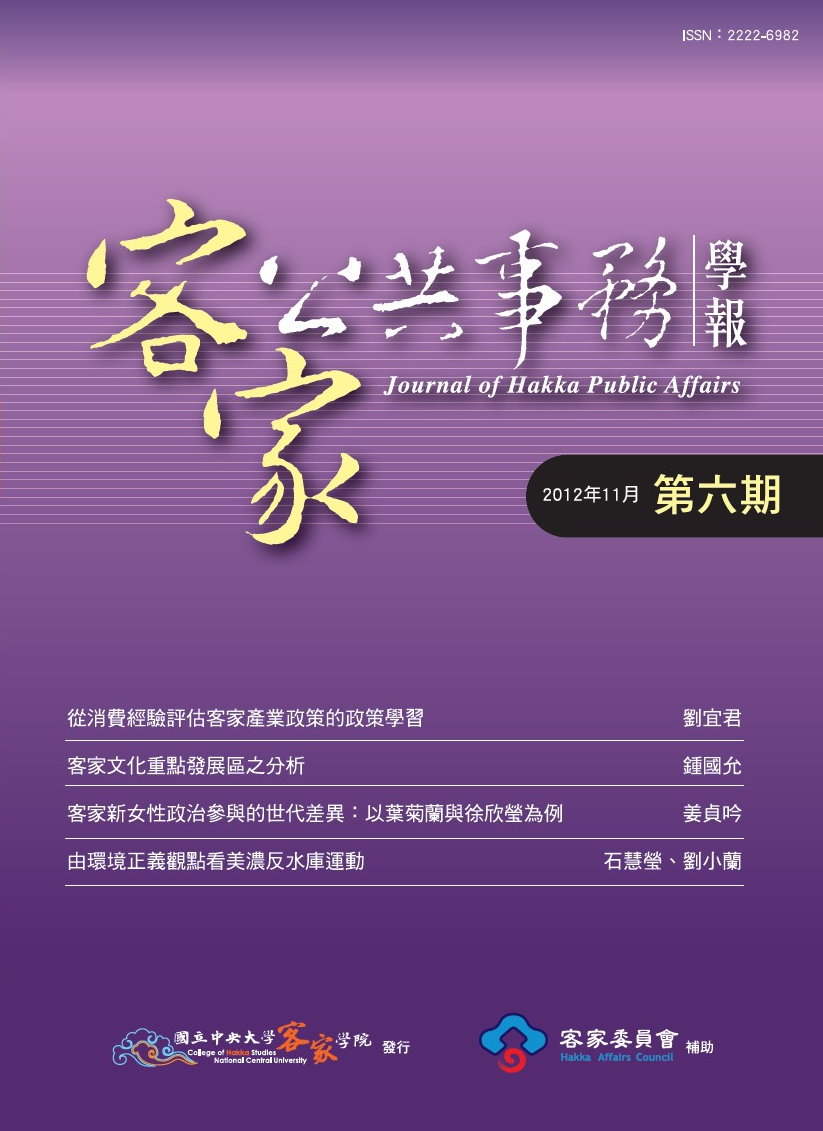Hot News
| 中文篇名 |
客家新女性政治參與的世代差異:以葉菊蘭與徐欣瑩為例 | |
|---|---|---|
| 英文篇名 |
The Generation Difference on Hakka New Women’s Political Participation: Take Chu-Lan Yeh and Hsin-Ying Hsu for Example | |
| 作者 | ||
| 中文摘要 |
台灣女性近年在政治場域的參與,不論在質與量上,都愈見增加與提高,也陸續出現女性參與政治的相關研究與討論,但是在政治場域的探討領域裡,客家女性的圖像辨識卻不是那麼的清楚與明顯,族群的身分並未成為鮮明的標誌,經常被忽略。相較於對歐美女性在參與政治場域的分析,國際文獻的分析層次經常把亞洲女性的參政視為一個整體,也認為台灣女性的參政多數是政治受難家屬類型,並認為這些女性是不熟悉政治事務的;而對近年新世代的年輕女性參政,卻又賦予年輕、活力、高學歷與專業的現代形象,兩者形成傳統保守被動與現代積極主動的鮮明對比。本研究探討客家女性政治參與,以葉菊蘭與徐欣瑩為例,探討她們首度參與選舉時的不同世代差異,釐清傳統與現代交融及混匯的樣貌。本研究結果發現,兩位客家女性參與選舉的世代差異可分為社會網絡(social net)與網際網絡(internet)之別,葉菊蘭所處世代的社會關係網絡為黨外運動同儕、徐欣瑩則為教育場域的各項人際資本;而前者接觸選民說明參選理念的方式為面對面的說明會、造勢活動,後者除了造勢活動與說明會之外,網際網路成為她長期、仔細地說明政見的工具,作為跟選民直接接觸的管道,顯見網際網路的應用改變了傳統選區選民投入選舉的方式。 | |
| 英文摘要 |
Taiwanese women’s participation in political field in recent years has been increasing quantitatively and qualitatively, and the study and discussion pertinent to women and political participation can also be seen consecutively. However, in the study of this political field, Hakka women’s iconic recognition seems not that clear and obvious; ethnic identity has not become a distinctive mark as to be ignored. Compared to the analysis of Western women’s political participation, international archive tends to see Asian women’s political participation as a whole, thinking they are unfamiliar with political affairs, while casting modern image of young, energetic, high academic background and professionalism on those young women of new generation, which makes it a starkly distinctive contrast between tradition, conservativeness, passiveness and modernity, aggressiveness, and activeness. This research aims to explore Hakka women’s political participation, take Chu-Lan Yeh and Hsin-Ying Hsu for example, delving into the difference existing in different generation for their debut participation in elections, to clarity the visage of mix and combination between tradition and modernity. This study result uncovers that the generation difference of these two Hakka women’s participation in election lies in the difference of social net and that of Internet. The social net of the generation Chu-Lan Yeh lives in is opposition party movement peers while Hsin-Ying Hsu’s is all kinds of interpersonal capital in educational field. The way the former gets in touch with electorates explicating her political participation ideology is face-to-face meetings and campaigning promotion activities; yet besides campaigning promotion activities and meetings, Internet turns to be the latter’s tool for explicating electoral concepts detailedly and delicately. In the same token, the application of Internet also changes the way traditional constituency’s electorates involved in elections. | |
| 關鍵詞 |
性別、政治參與、客家女性、選舉、gender、political participation、Hakka women、election | |
| 刊名 | ||
| 期數 | ||
| 起訖頁 |
049-079 | |
| 出版單位 | ||
| 上一篇 | ||
| 下一篇 |



